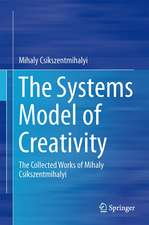Friendship and Happiness: Across the Life-Span and Cultures
Editat de Melikşah Demiren Limba Engleză Hardback – 21 apr 2015
In order to achieve a balanced evaluation of this area as a whole, many chapters in the book conclude with a critical appraisal of what is known about the role of friendship in happiness, and provide important directions for future research. Experts from different parts of the world provide in-depth, authoritative reviews on the association between different types of friendship experiences (e.g., friendship quantity, quality) and happiness in different age groups and cultures.
An ideal resource for researchers and students of positive psychology, this rich, clear, and up-to-date book serves as an important reference for academicians in related fields of psychology such as cross-cultural, developmental and social.
| Toate formatele și edițiile | Preț | Express |
|---|---|---|
| Paperback (1) | 563.66 lei 38-44 zile | |
| SPRINGER NETHERLANDS – 9 oct 2016 | 563.66 lei 38-44 zile | |
| Hardback (1) | 650.04 lei 6-8 săpt. | |
| SPRINGER NETHERLANDS – 21 apr 2015 | 650.04 lei 6-8 săpt. |
Preț: 650.04 lei
Preț vechi: 764.76 lei
-15% Nou
Puncte Express: 975
Preț estimativ în valută:
124.40€ • 129.14$ • 103.73£
124.40€ • 129.14$ • 103.73£
Carte tipărită la comandă
Livrare economică 25 martie-08 aprilie
Preluare comenzi: 021 569.72.76
Specificații
ISBN-13: 9789401796026
ISBN-10: 9401796025
Pagini: 250
Ilustrații: XII, 319 p. 1 illus.
Dimensiuni: 155 x 235 x 25 mm
Greutate: 0.69 kg
Ediția:2015
Editura: SPRINGER NETHERLANDS
Colecția Springer
Locul publicării:Dordrecht, Netherlands
ISBN-10: 9401796025
Pagini: 250
Ilustrații: XII, 319 p. 1 illus.
Dimensiuni: 155 x 235 x 25 mm
Greutate: 0.69 kg
Ediția:2015
Editura: SPRINGER NETHERLANDS
Colecția Springer
Locul publicării:Dordrecht, Netherlands
Public țintă
ResearchCuprins
Part I. Perspectives on Friendship and Happiness.- Chapter 1. Friendship and Happiness from a Philosophical Perpective; Sandra Lynch.- Chapter 2. Friendship and Happiness from a Sociological Perspective; Silvana Greco, Mary Holmes and Jordan McKenzie.- Chapter 3. Friends and Happiness: An Evolutionary Perspective on Friendship; David Lewis, Laith Al-Shaway, Eric M. Russell and David M. Buss.- Chapter 4. Friendship and Happiness: A Bidirectional Dynamic Process; Lina María Saldarriaga, William Bukowski and Carolina Greco.- Part II. Friendship and Happiness across the Lifespan: Reviews of the Literature.- Chapter 5. Children's Friendship and Positive Well-Being; Mark Holder and Ben Coleman.- Chapter 6. Friendship and Happiness in Adolescence; Catherine L. Bagwell, Karen P. Kochel and Michelle E. Schmidt.- Chapter 7. Friendship and Happiness among Young Adults; Melikşah Demir, Haley Orthel, Metin Özdemir and Sevgi Özdemir.- Chapter 8. Friendship and Happiness among Middle-Aged Adults;Katherine L. Fiori and Christy A. Denckla.- Chapter 9. Friendship and Happiness in the Third Age; Rebecca Adams and Emily M. Taylor.- Chapter 10. Cross-Sex Friendship and Happiness; Amanda Procsal, Melikşah Demir, Aysun Doğan, Ayça Özen and Nebi Sümer.- Chapter 11. Social Media, Friendship and Happiness in the Millennial Generation; Adriana M. Manago and Lanen Vaughn.- Part III. Friendship and Happiness across Cultures.- Chapter 12. Friendship and Happiness in Navajos (Bik’éí Diné Baa’ Hózhó); Angela A.A. Willeto.- Chapter 13. Friendship and Happiness in Latin America: A Review; Agnaldo Garcia, Fábio Nogueira Pereira and Maria Daniela Corrêa de Macedo.- Chapter 14. Family, Friends and Subjective Well-Being: A Comparison between the West and Asia; Tianyuan Li and Sheung-Tak Cheng.- Chapter 15. Attachment Avoidance Harms Friendship Quality and Life Satisfaction among Turkish Children; Nebi Sümer.- Chapter 16. How Are Positve and Negative Peer Relations Related to Positive and Negative Affect in Adolescents over Time? (New Zealand); Paul E. Rose.- Chapter 17. Friendship, Needs Satisfaction and Happiness among College Students in France and Lebanon; Melikşah Demir, Frédérique Cuisiner and Brigitte Khoury.- Chapter 18. I Am So Happy 'Cause My Best Friend Is There for Me When Things Are Go Right: Friendship and Happiness among Emerging Adults in Algeria and Slovakia; Melikşah Demir, Mustapha Achoui and Jaromir Simonek.
Recenzii
“Demir is to be touted for obtaining theperspectives and research from 43 authors … heralding from 16 differentcountries. … The book … would enrich undergraduate and graduate students ofpsychology, gerontology, philosophy, cultural anthropology, gender studies, andsociology. I would recommend it as a primer for graduate students about toembark on their original research as both a blueprint of what to do—and not—when operationalizing—or indeed, choosing—mercurial, multifaceted concepts.” (CarolA. Gosselink, PsycCRITIQUES, Vol. 60 (49), December, 2015)
Notă biografică
Melikşah Demir received his Ph.D. in developmental psychology from Wayne State University (Detroit, Michigan, USA) in 2007. He is currently an associate professor at Northern Arizona University (Flagstaff, Arizona, USA) since then. Since his graduate school years, Demir has been conducting research on friendship and happiness in different age groups (e.g., Demir & Urberg, 2004; Demir & Weitekamp, 2007; Demir, 2010). His current research focuses on delineating the processes and mechanisms responsible for the friendship-happiness link (e.g., Demir & Ozdemir, 2010). Specifically, Melikşah Demir is testing different theoretical models that could explain why friendship is related to happiness. He also conducts cross-cultural studies to examine whether the role of friendship in happiness is similar in different cultures.
Textul de pe ultima copertă
This is the first book that explicitly focuses on the relationships between various types of friendship experiences and happiness. It addresses historical, theoretical, and measurement issues in the study of friendship and happiness (e.g., why friends are important for happiness).
In order to achieve a balanced evaluation of this area as a whole, many chapters in the book conclude with a critical appraisal of what is known about the role of friendship in happiness, and provide important directions for future research. Experts from different parts of the world provide in-depth, authoritative reviews on the association between different types of friendship experiences (e.g., friendship quantity, quality) and happiness in different age groups and cultures.
An ideal resource for researchers and students of positive psychology, this rich, clear, and up-to-date book serves as an important reference for academicians in related fields of psychology such as cross-cultural, developmental and social.
In order to achieve a balanced evaluation of this area as a whole, many chapters in the book conclude with a critical appraisal of what is known about the role of friendship in happiness, and provide important directions for future research. Experts from different parts of the world provide in-depth, authoritative reviews on the association between different types of friendship experiences (e.g., friendship quantity, quality) and happiness in different age groups and cultures.
An ideal resource for researchers and students of positive psychology, this rich, clear, and up-to-date book serves as an important reference for academicians in related fields of psychology such as cross-cultural, developmental and social.
Caracteristici
Focuses explicitly on the role of friendship experiences in happiness Covers theory and recent empirical research regarding the role of friendship in happiness in different cultures Provides important directions for future research Includes supplementary material: sn.pub/extras











